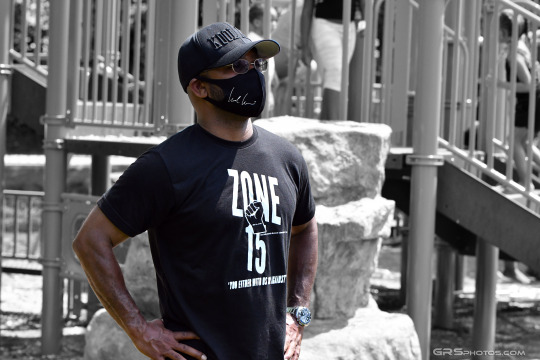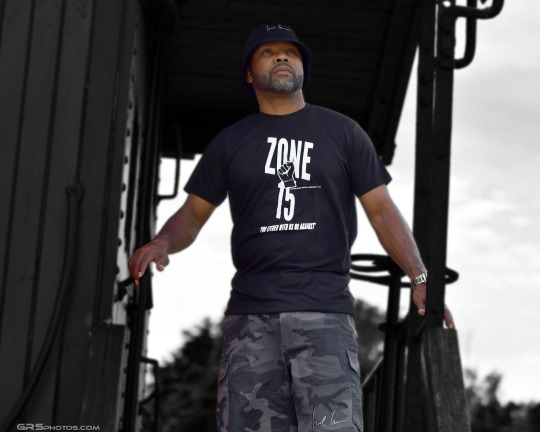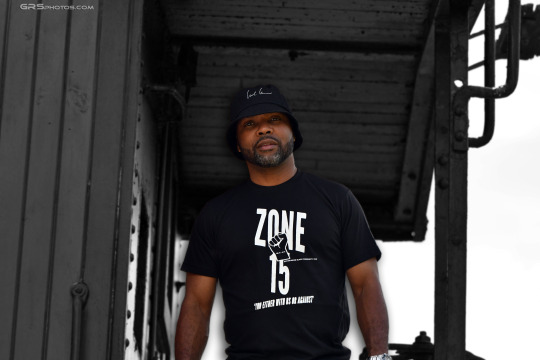#voicesofthezone
Explore tagged Tumblr posts
Photo

Chris Gillam, has a 16 year-old son and he describes the discussion a parent must have, when raising a black son, as “protocol.” According to Gillam, every time his son goes out of the house, he has certain “protocol” reminders. “Do you have your license?” “Do not reach for you license.” “Keep your hands on the steering wheel at ALL times.” “Do not give the officer any reason.” You continually train your son to act and talk a certain way, when interacting with law enforcement. And it’s your hope that when they do have a police encounter that their training will kick in, as second nature.
“I don’t know if that’s how white parents talk to their children about being pulled over. But, that is how you have to coach and train your children, as a black parent”, said Gillam. It’s ever-present in the black community and “if black parents are not having these conversations, shame on them.” He said, “you have to be as non-threatening as you possibly can, in that environment and as compliant, as possible.” When asked, if this was something you must be cognizant of on a daily basis, as a black man. Gillam responded, “if you wanna live.”
Gillam, grew up in Woodlawn, part of the Zone 15 community and has quite the resume. He is the Owner of The Grind Shop: Sports Performance Training; the Defensive Coordinator, College Recruiting Coordinator, and Director of Strength and Conditioning at Princeton High School; the Co-Founder of Redeemed Xposure; and Co-Owner of a flag football league. But, Gillam is much more than his accolades; he is a mentor, an educator, an advocate, a mediator, a motivator, a helper, and someone who leads by example.
He takes pride in being from “Zone 15” and the Woodlawn community. He has witnessed the economic decline of Lincoln Heights and Woodlawn, over the years; development and growth have been an issue for a long time in these areas. According to Gillam, this is not just isolated to Zone 15, many predominately black neighborhoods, have experienced shrinking economies and a reduction in affordable housing, due to systemic racism.”
The disparage between the predominately white community of Wyoming and Zone 15 is a prime example. Wyoming borders, Lockland and the two communities are separated by railroad tracks. Gillam, describes crossing the tracks from Wyoming to Lockland, as “heaven and hell.” “You have thriving businesses on the Wyoming side and on the Lockland side there are dilapidated buildings. The sad thing is, you see it so much, you become de-sensitized to it.” Gillam is hopeful that the Zone 15 community can regrow and prosper, as it once did.
Miami, FL, 2017, and Gillam is seated at the table with 50 other gym owners from around the world, in an open forum with CrossFit Champion and owner of NCFIT, Jason Khalipa. Gillam recalls, Khalipa asking the room full of gym owners, who has “CrossFit” in their gym name. Most everyone raised their hand, except for Gillam. Khalipa’s gyms were formerly called NorCal CrossFit and he illustrated the importance of not limiting your gym to the CrossFit brand. He encouraged the gym owners to remove CrossFit from their names, citing that any negativity geared toward the brand could have an adversarial affect to their personal gyms.
Fast forward to 2020, amidst the murder of George Floyd, the CEO of CrossFit, Greg Glassman, refuses to put out a statement on CrossFit’s behalf in support of the Black Lives Matter movement. Glassman, tweets a racially negative remark and the unraveling of the CrossFit brand begins. As a result, thousands of gyms de-affiliated with the CrossFit brand. Khalipa’s advice, reverberates in Gillam’s mind. Gillam arose out of this controversy as a sounding board, advocate, listener, and confidant to other local gym owners. Gillam says, “I was happy and honored to help others understand the gravity of the situation. I accepted and welcomed the call.”
Glassman’s comments reflect the whiteness of the CrossFit brand. Gillam’s gym, The Grind Shop, is quite diverse and that’s one thing he loves about it. That diversity contributed towards progressive conversations between Gillman and his members. He said that, after the killing of George Floyd, he had members come to him and ask for his help. People wanted to be educated and obtain an understanding on the current racial injustice climate. Gilllam says, “so many people are not racist, they just don’t understand. They are clueless to the conversations that I have to have with my black son. They are clueless to the number of people that have been victims to social injustices. They just don’t know.” Gillam believes, we have to be willing to aid in everyone’s growth and keep the conversations going about the plight of the black community.
The question was raised, if there was allowable ignorance in this current climate and Gillam gave the golden response. “Prior to George Floyd’s passing and the unrest that it has generated in our country, you are no longer allowed to be ignorant to racism and social injustice. People and sports leagues were given a pass. The NFL didn’t understand why Kap took a knee. They didn’t see the seriousness of this issue in our society. But now, they get it. Now it’s the responsibility of the human race to get involved, to know what is going on in the black community and aid in the progress, toward ending racism.
Follow The Grind Shop on Facebook, Instagram and Coach Gill on Twitter.
Photo credit: 1takebake
#wearetherightsideofhistory#cincinnati#lincolnheights#project15#blacklivesmatter#blackcommunities#blackcommunitiesmatter#blackbusiness#blackBUSINESSESmatter#blackaware#blackawareness#blackstories#blackphotographers#blackphotography#blackownedbusiness#realstories#realpeoplerealstories#voicesofthezone#ohio#awareness
0 notes
Photo





Ken Powell, enlightens people through his music. He said, “my music raises awareness and conveys what’s happening in the neighborhood.” Many of you may know him as Kool Ken, he is a man of many talents. He is an activist, a musician, a producer, a teacher, an athlete, an educator, an entrepreneur, a coach, a veteran and much, much more. Ken is a native of Lincoln Heights and currently resides in Fairfield, but is still deep rooted in the Lincoln Heights community.
Ken abides by the golden rule of “I treat people, how I want to be treated.” Which is why he is motivated and committed in teaching “mutual respect”. Ken says, “its my duty and my job to assist people in understanding the truth.” Black people just want to be equal, we are not asking for “special” treatment. Ken says, “at the end of the day, we all just want peace, but we also must have equality to gain peace.”
Raising awareness is key and educating people on the “plight of the black community.” He said, “I can’t go get a loan, the same way you can. We have churches in our communities that deposit money into banks, but they (the banks) won’t make a loan to the neighborhood folks. They take that money out of the community.” According to Ken, this type of information is important, in order to halt the continual patterns of social injustice. We must have “uncomfortable conversations”, says Ken. No longer can people ignore, that these injustices exist. Ken said he was impressed to see “more of my white brothers and sisters, standing up for what’s right and unequivocally saying, STOP; enough is enough.” It’s refreshing to see people wanting to protect humanity again and speaking out against injustices, it’s the only way to bring about change.
When Ken was 13 or 14 years old, he and some buddies pulled their money together and decided to walk a couple of miles from their neighborhood of Lincoln Heights to the White Castle in Reading. Lincoln Heights, a predominately black neighborhood was gravely segregated from Reading, a predominately white neighborhood. Upon entering the corporation limits of Reading, Ken recalls adults driving by, pointing and looking at them walking down the street. Then a car of adults, pulls up and throws full unopened beer cans at him and his friends, while hurling racial slurs. Ken said, “I wasn’t scared, I was mad.” No one was hurt, but we were all angry.
This incident is one of several that Ken has encountered, as a black man. He has been racially profiled by law enforcement, more times than he can count. He has been arrested and ticketed by officers, who wasn’t willing to hear his side of a situation. One incident in particular, during Ken’s adulthood, which involved a white driver, who ran Ken off the road; resulted in Ken’s arrest and the white driver walking away with zero ramifications. The unwillingness of some police officers to treat black men equal to their white counterparts, is why black parents, have to have conversations with their black children on how to interact with the police. This dialogue happens in most, all black homes, as parents don’t want their child to be another victim of police brutality. “It’s inevitable”, Ken says, “most black men will have these types of police encounters in their lifetime.”
According to Ken, “black people are conditioned to think inferior and with that comes your acceptance of being treated as inferior.” Growing up in the predominately black neighborhood of Lincoln Heights, most every person Ken encountered of authority, was white. Ken said, “We grew up in a black neighborhood, but what color was the dentist, the doctor, the teacher, the mailman, the principal….they were all white.” Ken had little to no white classmates, but he was surrounded by white people in authoritative roles.
Growing up in Lincoln Heights, your goal was to leave Lincoln Heights, according to Ken. You wanted to do better than your neighborhood and being successful, meant you couldn’t live in Lincoln Heights. Ken said, “the idea was you were doing good, if you had a big house and white neighbors. But, what you didn’t realize is those white neighbors don’t want you there, when you move in, they move out.” “It’s perception that if you live in a ‘bad’ neighborhood, it’s predominately black. And if you live next to white people, you are successful.” The idea of being around ‘whiteness’ as a sign of success, is an example of systemic racism. The concept of ‘being white is right’ is so ingrained in our society that it has caused the decline of black communities.
Ken said, as an adult, he understands that leaving your your community isn’t the answer. Once you become “cognizant of your surroundings, you realize how important it is to give back to your neighborhood.” Younger generations need to see people, like them, succeeding. “My generation was ignorant and didn’t know that if we leave our communities, they are not going to grow. Nothing will get better and the generations behind us will be lost”, said Ken. That’s why Ken is trying to raise awareness of the importance of coming back and staying in Lincoln Heights.
Ken describes his time growing up in Lincoln Heights, as great. “I had a great childhood”, Ken said. “I was surrounded by family and friends. And Lincoln Heights was a close knit community”. Ken’s childhood sounds just like most kids, growing up in the 70s and 80s. Ken’s childhood is colorless, in a sense, it resembles most kids of any race. “We just did normal stuff”, said Ken, “we went to Kings Island, skating, movies, and played sports.” Ken was quite the athlete, playing football, basketball, and wrestling. He later went onto wrestle on the collegiate level and is now a wrestling coach for Princeton High School.
When Ken was a kid in Lincoln Heights, he said, “It was different from what it is today. It was a community, it was autonomous and provided its own services to its citizens.” “We had a fire department and a police department, now we have to rely on the County and outside communities for those services”, said Ken. During my childhood, “there were high expectations on us, as kids”, says Ken, “our community wanted us to do great things and we would see Lincoln Heights’ alumni going to college and doing stuff like that.” He is fearful that the younger generations in Lincoln Heights don’t have the same expectations, as he did growing up.
Lincoln Heights Elementary is part of the Princeton City School District and is the poorest elementary in the district, according to Ken. The neighborhood has been beaten down and opportunities have passed it over. We can’t expect our young people to rise up, if we continue the cycle that our community has labored in, for years. “We need to change the way we approach the situation, young and old”, says Ken, “otherwise, change will not occur.”
Ken still considers Lincoln Heights home. He believes in the people, their strength and their strong commitment to their community. He says, “it can be great and that’s our goal, but it’s going to come with a lot of hard work.” Growth within the community is what it will take for us to succeed. “We need leaders and visionaries, such as myself, to move back to Lincoln Heights. Moving out of Lincoln Heights, takes away form the neighborhood”, says Ken. It’s integral that we grow the community, not only by its residents, but also economically.
Ken is motivated and an activist, two important pieces to the puzzle of putting Lincoln Heights back together. If anyone can push the Lincoln Heights agenda, it’s Ken. He is well respected, determined and has a strong commitment to the community of Lincoln Heights.
Support Ken and check out his music here and his production company here.
📷1takebake
#voicesofthezone#wearetherightsideofhistory1946#wearetherightsideofhistory#cincinnati#zone15#project15#blacklivesmatter#blackcommunitiesmatter#blackawareness#blackcommunities#blackaware#awareness#socialawareness#socialinjustice#blackphotography#photography#blackphotographers#systemicracism#peopleofzone15#realpeoplerealstories#racialoppression#lifestories#blackstories#ohio#lincolnheights#blackbusiness#blackbusinessesmatter#realstories
0 notes